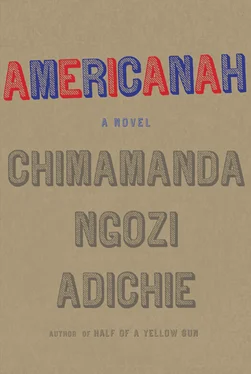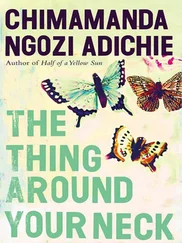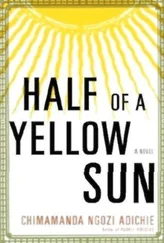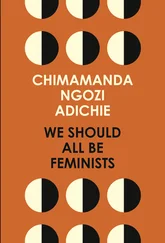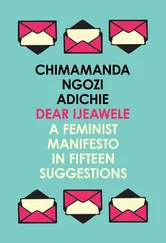She had, in the years since they got married, grown an intemperate dislike of single women and an intemperate love of God. Before they got married, she went to service once a week at the Anglican church on the Marina, a Sunday tick-the-box routine that she did because she had been brought up that way, but after their wedding, she switched to the House of David because, as she told him, it was a Bible-believing church. Later, when he found out that the House of David had a special prayer service for Keeping Your Husband, he had felt unsettled. Just as he had when he once asked why her best friend from university, Elohor, hardly visited them, and Kosi said, “She’s still single,” as though that was a self-evident reason.

MARIE KNOCKED on his study door and came in with a tray of rice and fried plantains. He ate slowly. He put in a Fela CD and then started to write the e-mail on his computer; his BlackBerry keyboard would cramp his fingers and his mind. He had introduced Ifemelu to Fela at university. She had, before then, thought of Fela as the mad weed-smoker who wore underwear at his concerts, but she had come to love the Afrobeat sound and they would lie on his mattress in Nsukka and listen to it and then she would leap up and make swift, vulgar movements with her hips when the run-run-run chorus came on. He wondered if she remembered that. He wondered if she remembered how his cousin had sent mix tapes from abroad, and how he made copies for her at the famous electronics shop in the market where music blared all day long, ringing in your ears even after you had left. He had wanted her to have the music he had. She had never really been interested in Biggie and Warren G and Dr. Dre and Snoop Dogg but Fela was different. On Fela, they had agreed.
He wrote and rewrote the e-mail, not mentioning his wife or using the first person plural, trying for a balance between earnest and funny. He did not want to alienate her. He wanted to make sure she would reply this time. He clicked Send and then minutes later checked to see if she had replied. He was tired. It was not a physical fatigue — he went to the gym regularly and felt better than he had in years — but a draining lassitude that numbed the margins of his mind. He got up and went out to the verandah; the sudden hot air, the roar of his neighbor’s generator, the smell of diesel exhaust fumes brought a lightness to his head. Frantic winged insects flitted around the electric bulb. He felt, looking out at the muggy darkness farther away, as if he could float, and all he needed to do was to let himself go.
Mariama finished her customer’s hair, sprayed it with sheen, and, after the customer left, she said, “I’m going to get Chinese.”
Aisha and Halima told her what they wanted — General Tso’s Chicken Very Spicy, Chicken Wings, Orange Chicken — with the quick ease of people saying what they said every day.
“You want anything?” Mariama asked Ifemelu.
“No, thanks,” Ifemelu said.
“Your hair take long. You need food,” Aisha said.
“I’m fine. I have a granola bar,” Ifemelu said. She had some baby carrots in a Ziploc, too, although all she had snacked on so far was her melted chocolate.
“What bar?” Aisha asked.
Ifemelu showed her the bar, organic, one hundred percent whole grain with real fruit.
“That not food!” Halima scoffed, looking away from the television.
“She here fifteen years, Halima,” Aisha said, as if the length of years in America explained Ifemelu’s eating of a granola bar.
“Fifteen? Long time,” Halima said.
Aisha waited until Mariama left before pulling out her cell phone from her pocket. “Sorry, I make quick call,” she said, and stepped outside. Her face had brightened when she came back; there was a smiling, even-featured prettiness, drawn out by that phone call, that Ifemelu had not earlier seen.
“Emeka work late today. So only Chijioke come to see you, before we finish,” she said, as if she and Ifemelu had planned it all together.
“Look, you don’t have to ask them to come. I won’t even know what to tell them,” Ifemelu said.
“Tell Chijioke Igbo can marry not Igbo.”
“Aisha, I can’t tell him to marry you. He will marry you if he wants to.”
“They want marry me. But I am not Igbo!” Aisha’s eyes glittered; the woman had to be a little mentally unstable.
“Is that what they told you?” Ifemelu asked.
“Emeka say his mother tell him if he marry American, she kill herself,” Aisha said.
“That’s not good.”
“But me, I am African.”
“So maybe she won’t kill herself if he marries you.”
Aisha looked blankly at her. “Your boyfriend mother want him to marry you?”
Ifemelu thought first of Blaine, then she realized that Aisha, of course, meant her make-believe boyfriend.
“Yes. She keeps asking us when we will get married.” She was amazed by her own fluidness, it was as if she had convinced even herself that she was not living on memories mildewed by thirteen years. But it could have been true; Obinze’s mother had liked her, after all.
“Ah!” Aisha said, in well-meaning envy.
A man with dry, graying skin and a mop of white hair came in with a plastic tray of herbal potions for sale.
“No, no, no,” Aisha said to him, palm raised as though to ward him off. The man retreated. Ifemelu felt sorry for him, hungry-looking in his worn dashiki, and wondered how much he could possibly make from his sales. She should have bought something.
“You talk Igbo to Chijioke. He listen to you,” Aisha said. “You talk Igbo?”
“Of course I speak Igbo,” Ifemelu said, defensive, wondering if Aisha was again suggesting that America had changed her. “Take it easy!” she added, because Aisha had pulled a tiny-toothed comb through a section of her hair.
“Your hair hard,” Aisha said.
“It is not hard,” Ifemelu said firmly. “You are using the wrong comb.” And she pulled the comb from Aisha’s hand and put it down on the table.

IFEMELU HAD GROWN UP in the shadow of her mother’s hair. It was black-black, so thick it drank two containers of relaxer at the salon, so full it took hours under the hooded dryer, and, when finally released from pink plastic rollers, sprang free and full, flowing down her back like a celebration. Her father called it a crown of glory. “Is it your real hair?” strangers would ask, and then reach out to touch it reverently. Others would say “Are you from Jamaica?” as though only foreign blood could explain such bounteous hair that did not thin at the temples. Through the years of childhood, Ifemelu would often look in the mirror and pull at her own hair, separate the coils, will it to become like her mother’s, but it remained bristly and grew reluctantly; braiders said it cut them like a knife.
One day, the year Ifemelu turned ten, her mother came home from work looking different. Her clothes were the same, a brown dress belted at the waist, but her face was flushed, her eyes unfocused. “Where is the big scissors?” she asked, and when Ifemelu brought it to her, she raised it to her head and, handful by handful, chopped off all her hair. Ifemelu stared, stunned. The hair lay on the floor like dead grass. “Bring me a big bag,” her mother said. Ifemelu obeyed, feeling herself in a trance, with things happening that she did not understand. She watched her mother walk around their flat, collecting all the Catholic objects, the crucifixes hung on walls, the rosaries nested in drawers, the missals propped on shelves. Her mother put them all in the polyethylene bag, which she carried to the backyard, her steps quick, her faraway look unwavering. She made a fire near the rubbish dump, at the same spot where she burned her used sanitary pads, and first she threw in her hair, wrapped in old newspaper, and then, one after the other, the objects of faith. Dark gray smoke curled up into the air. From the verandah, Ifemelu began to cry because she sensed that something had happened, and the woman standing by the fire, splashing in more kerosene as it dimmed and stepping back as it flared, the woman who was bald and blank, was not her mother, could not be her mother.
Читать дальше
